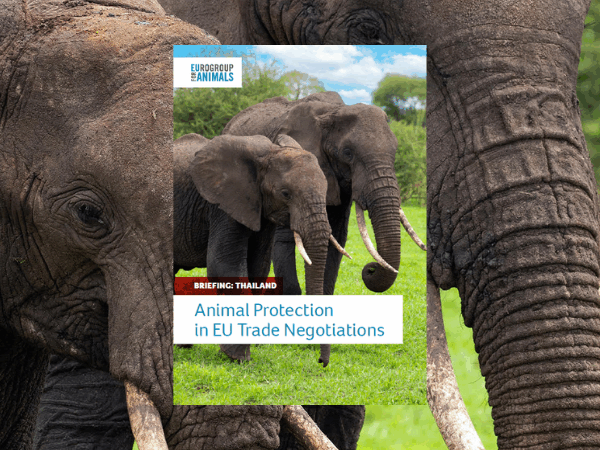AUTHORS: Eline Blot, Auriane Flottes de Pouzols, Nora Hiller
This report explores the options for improving animal welfare and sustainability in the context of an EU-Thailand free trade agreement, for which negotiations were relaunched in 2023.
Together with the EU’s forthcoming revision of its animal welfare legislation, the negotiations present an opportunity to strengthen EU-Thailand cooperation on animal welfare for both farmed and wild animals.
As an export-oriented country, Thailand has specialised in the production of primarily machinery, transport equipment and agri-food products. Seeking improved market access with Southeast Asian countries, the EU initially launched trade negotiations in 2013, but talks quickly came to a halt following Thailand’s 2014 military coup. Almost ten years later, the EU relaunched negotiations for a free trade agreement (FTA) with Thailand in 2023.
While EU imports from Thailand are largely manufactured goods, agri-food products make up about 11% of total imports. Thailand is a leading global exporter of preserved and prepared chicken, canned tuna, frozen shrimp, and pig meat. Preserved and prepared chicken alone represents one-fifth of EU agri-food imports from Thailand. A future trade agreement could increase market access for these and other agri-food products.
The negotiations create a critical window for improving animal welfare and sustainability. In practice, Thailand’s main animal protection law – the Prevention of Animal Cruelty and Animal Welfare Provision Act (2014) – contains regulatory and enforcement gaps, leading to insufficient protections for farm animals and wildlife. Though agri-food exporters to the EU can obtain the voluntary Good Agricultural Practices standard for farm animals, which is broadly aligned with EU requirements, concerns persist over the health and welfare of poultry, pigs, and fish destined for domestic markets.
Beyond farm animal welfare, the FTA could advance cooperation on biodiversity and environmental protection. Thailand faces persistent challenges in combating illegal, unreported and unregulated (IUU) fishing, curbing the illegal wildlife trade, preventing deforestation, and addressing the exploitation of captive wildlife for tourism. Despite laws such as the Wild Animal Reservation and Protection Act and CITES membership, enforcement gaps remain. Illegal wildlife trade (elephants, tigers, pangolins, rhinos) continues to threaten biodiversity, compounded by deforestation, which has reduced Thailand’s forest cover from 53% in 1960 to about one-third today. Tourism activities such as elephant riding and tiger photo opportunities exacerbate welfare concerns.
Aligning trade with higher EU standards. As the EU revises its animal welfare legislation and seeks to apply higher standards to imports, the Thailand FTA offers an opportunity to secure stronger commitments on sustainable food systems, animal welfare, biodiversity protection, and forest management. Dedicated cooperation mechanisms within the agreement could ensure meaningful implementation and long-term impact.
Key Recommendations
- Sustainable Food Systems and animal welfare
- Establish formal cooperation through dedicated committees or working groups with clear timelines and meeting frequencies.
- Explicitly recognise animal sentience and set standards for humane transport and slaughter.
- Include aquatic animal welfare alongside terrestrial animal welfare.
- Trade and sustainable development
- Strengthen environmental provisions on fisheries, aquaculture, biodiversity, wildlife trade, and forests.
- Combat IUU fishing, prevent overfishing, promote stock recovery, minimise bycatch, and enforce sustainable aquaculture practices.
- Implement CITES and CBD obligations, phase out domestic laws enabling wildlife domestication for private or tourism use, and restore ecosystems to reduce biodiversity loss and human–wildlife conflicts.
- Support sustainable forest management, combat illegal logging, address commodity-driven deforestation, and promote dialogue to improve biodiversity outcomes and ensure compliance with the EU Deforestation Regulation.
This report was commissioned by the Eurogroup for Animals to examine levels of animal protection in Thailand in the context of the ongoing FTA negotiations.

